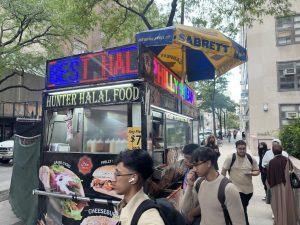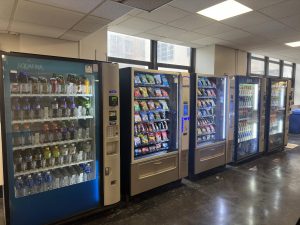
It’s not a surprise that Hunter College is located in one of the richest neighborhoods in New York City. The ironic juxtaposition of struggling college students feet away from some of the city’s most elite creates a dilemma for Hunter’s students deciding what to eat.
While cooking and bringing food from home can help reduce food expenses, it may not be the most ideal approach when it comes to college students. Many Hunter students avoid cooking due to the inconvenience and time demands of their schedules despite high takeout prices and limited affordable options around Hunter.
According to a survey conducted for DoorDash by Wakefield Research, 70 percent of college students order food from a third-party delivery platform per week, ordering four times per week on average. Many Hunter college students admit that ordering out is often due to time constraints or accessibility.
“I have an 8:30 class. I have an hour commute to school. In order for me to make fresh breakfast, I would have to wake up at 5 in the morning.” said Mercedes Ortega, a junior at Hunter college.
Like many college students, Ortega struggles to balance her time between school, commuting and personal life. Ordering out cuts the preparation and cooking time to create a meal from scratch. Students at Hunter have to balance between rigorous studies and time management.
Ratul Ahmed is a junior at Hunter College double majoring in human biology and philosophy. Ahmed is a full time student that also balances sports and attending clubs. Cooking a meal is impractical for his busy schedule.
“At least with my studies, I feel like I don’t have enough time to commit to cooking- I’m always like, I could be studying right now,” said Ahmed.
However, ordering out does come with financial and nutritional implications for most students. Ordering out can become expensive with repeated purchases. Budget friendly options can often be unhealthy and lack nutritional necessities.
“My food habits have gotten more trashy in college because the cheaper stuff is literally chips and stuff.” said Ortega when asked about her eating habits.
“It’s more about convenience than actually enjoying food because sometimes the food is trash but you gotta eat,” Ortega continued.
Ortega often finds herself eating outside food, despite knowing that it’s more expensive and less nutritious. This trade-off between convenience and health is a constant battle for students juggling busy schedules and tight budgets.

Chris Shields who is a graduate student and employee at the Purple Pantry located on Hunter’s main campus advises students that eating healthy is important. Shields urges students to be conscious of what they put in their body as it can affect how they may feel.
“The best way with food is not thinking so much how it tastes but how it makes my body feel,” he says. “You can eat the most delicious meal but if it makes you tired after then it’s not good.”
According to an observational study presented at the European Congress on Obesity, increased stress during university examinations is associated with eating a poorer quality diet including less fruit and vegetables and more fast food. This trend highlights the challenges students face in balancing academic pressures with maintaining healthy eating habits.
There are some students who prioritize health over accessibility. Shazid Maiaz is a human biology major at Hunter College who enjoys cooking his own meals and bringing them from home for lunch. Maiaz finds time to “meal-prep” at the start of the week to ensure he has the necessary time to study while practicing conscious eating.
“Most of the time, I like being in control of what I eat or watching what I eat as well,” said Maiaz.
Eating affordable and healthy while maintaining an academic career is difficult, but possible. To combat this issue, many students can utilize food apps to scout for deals or stock up on healthy snacks like fruit cups and granola bars in bulk during grocery trips. Students can also utilize the Purple Apron Food Pantry located on the main campus to stock up on groceries and snacks.
Ultimately, Hunter College students face a tough choice when it comes to food as the convenience of ordering out often outweigh the time and effort required to cook at home due to busy schedules, long commutes, and limited resources. While takeout offers a quick fix, the high costs and lack of nutritional value leave many students wishing for a better balance between convenience and healthy eating options.
